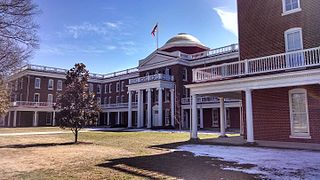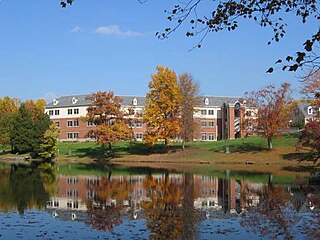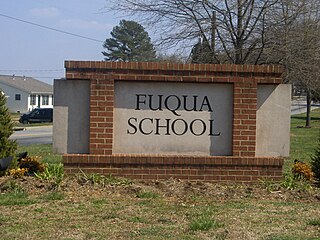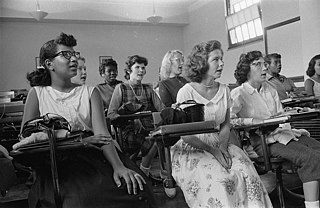
Prince Edward County is located in the Commonwealth of Virginia. As of the 2020 census, the population was 21,849. Its county seat is Farmville.

Brentwood School is an independent, secular, coeducational day school with two campuses located four blocks apart in the Brentwood neighborhood of Los Angeles, California, United States.

Massive resistance was a political strategy created by American politicians Harry F. Byrd and James M. Thomson aimed at getting Virginia officials to pass laws and policies preventing public school desegregation, particularly after Brown v. Board of Education. Many schools and an entire school system were shut down in 1958 and 1959 in attempts to block integration.

Memphis University School (MUS) is a college-preparatory, independent, day school for boys, grades 6–12, located in Memphis, Tennessee.

Trinity Christian School is a private, K-12, non-denominational Christian school centrally located in Fairfax County, Virginia, serving the Northern Virginia area of metropolitan Washington, DC.

Segregation academies are private schools in the Southern United States that were founded in the mid-20th century by white parents to avoid having their children attend desegregated public schools. They were founded between 1954, when the U.S. Supreme Court ruled that segregated public schools were unconstitutional, and 1976, when the court ruled similarly about private schools.

Fuqua School is a private primary and secondary school located in Farmville, Virginia. Founded in 1959 as Prince Edward Academy, a whites-only segregation academy, the school was renamed after businessman J. B. Fuqua made a large contribution to the school in 1993.
Arlington Public Schools is a public school division in Arlington County, Virginia. In 2019, student enrollment was 28,020 students, with students coming from more than 146 countries. In 2015, there were 2,166 teachers. There are 24 elementary schools, 6 middle schools, 4 high schools, 1 secondary institution and 4 other educational programs within the school district.

Franklin Road Academy (FRA) is a private co-educational Christian school for students in pre-kindergarten through grade 12 located in Oak Hill, Tennessee. The school was founded in 1971 and originally affiliated with the First Christian Church before it became a separate incorporated organization in 1982. FRA has been described as a segregation academy, like other schools established after a court ordered Nashville public schools to expand desegregation busing.
Green v. County School Board of New Kent County, 391 U.S. 430 (1968), was an important United States Supreme Court case involving school desegregation. Specifically, the Court dealt with the freedom of choice plans created to avoid compliance with the Supreme Court's mandate in Brown II in 1955. The Court held unanimously that New Kent County's freedom of choice plan did not adequately comply with the school board's responsibility to determine a system of admission to public schools on a non-racial basis. The Supreme Court mandated that the school board must formulate new plans and steps towards realistically converting to a desegregated system. Green v. County School Board of New Kent County was a follow-up of Brown v. Board of Education.
Amelia Academy is an independent co-educational college preparatory school in Amelia, Virginia. It was founded in 1964 as a segregation academy. The campus is located within the rural Piedmont region of central Virginia.

Wakefield High School is one of five public high schools located in Arlington, Virginia, United States, closely bordering Alexandria. It has 152 teachers and 2,716 students in grades 9–12 as of the 2023–2024 academic year.

Wakefield Country Day School is a co-educational, independent, non-sectarian elementary, middle, and high school situated in Rappahannock County, United States and serving grades preschool through grade 12. The school's 12-acre (49,000 m2) campus is located near the town of Flint Hill, about 90 minutes from Washington, DC. Founded and in continuous operation since 1972, the school is accredited with the Virginia Independent School Association and is part of the Virginia Independent Schools Athletic Association. The second largest private employer in Rappahannock, the school as of September 2023 had an enrollment of just under 200 students from Rappahannock county and nearby counties — Culpeper, Fauquier, Frederick, Madison, Page, Prince William, Shenandoah and Warren.
Hampton Roads Academy is a private, independent, co-educational, day school in Newport News, Virginia serving 644 students in grades Pre-K through twelve, and part of the Tidewater Conference of Independent Schools. HRA is accredited through the Virginia Association of Independent Schools, and is a member of the National Association of Independent Schools. The average class size is 16, and there were 65 students in the Class of 2017. The school was founded in 1959, in the context of massive resistance, as a segregation academy.

Kenston Forest School (KFS) is a college-preparatory school located in Blackstone, Virginia, United States.

Orangeburg Preparatory Schools, Inc. is an independent, college-preparatory, coeducational day school enrolling students in preschool through 12th grade. It is located in Orangeburg, South Carolina. Orangeburg Prep has two campuses: the Lower Campus, housing preschool to 5th grade; and the Upper Campus, housing grades 6 to 12. OPS also operates a year-round day care center on the Lower Campus. Orangeburg Prep was formed through the merger of two segregation academies, Wade Hampton Academy and Willington Academy.

Claiborne Academy is a private, non-profit, pre-kindergarten through 12th grade school located in unincorporated Claiborne Parish, Louisiana, between Haynesville and Homer. It was founded in 1969 as a segregation academy. Their nickname is the Rebels, the school newspaper is the Rebel Yell, and their school symbol is the Confederate battle flag.
The Stanley Plan was a package of 13 statutes adopted in September 1956 by the U.S. state of Virginia. The statutes were designed to ensure racial segregation would continue in that state's public schools despite the unanimous ruling of the U.S. Supreme Court in Brown v. Board of Education (1954) that school segregation was unconstitutional. The legislative program was named for Governor Thomas B. Stanley, a Democrat, who proposed the program and successfully pushed for its enactment. The Stanley plan was a critical element in the policy of "massive resistance" to the Brown ruling advocated by U.S. Senator Harry F. Byrd Sr. The plan also included measures designed to curb the Virginia state chapter of the National Association for the Advancement of Colored People (NAACP), which many Virginia segregationists believed was responsible for "stirring up" litigation to integrate the public schools.

In the United States, school integration is the process of ending race-based segregation within American public and private schools. Racial segregation in schools existed throughout most of American history and remains an issue in contemporary education. During the Civil Rights Movement school integration became a priority, but since then de facto segregation has again become prevalent.
St. Vincent de Paul High School was a private, parochial high school in Petersburg, Virginia until 2001. Its campus was at 240 Wagner Road, which had been the campus of its predecessor, the Bollingbrook School.














